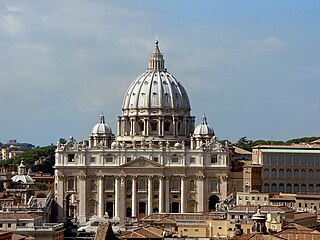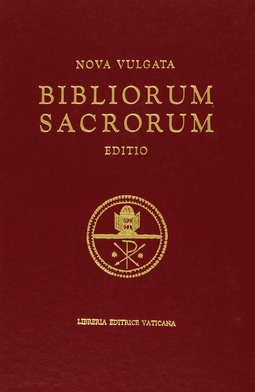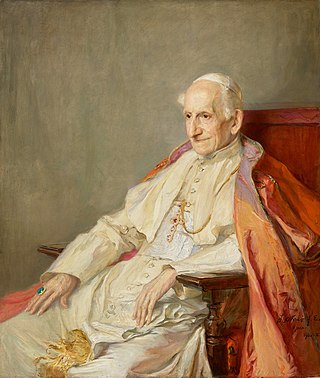
The Vulgate, sometimes referred to as the Latin Vulgate, is a late-4th-century Latin translation of the Bible.

Dei verbum, the Second Vatican Council's Dogmatic Constitution on Divine Revelation, was promulgated by Pope Paul VI on 18 November 1965, following approval by the assembled bishops by a vote of 2,344 to 6. It is one of the principal documents of the Second Vatican Council.

The New American Bible (NAB) is an English translation of the Bible first published in 1970. The 1986 Revised NAB is the basis of the revised Lectionary, and it is the only translation approved for use at Mass in the Latin Church Catholic dioceses of the United States and the Philippines, and the 1970 first edition is also an approved Bible translation by the Episcopal Church in the United States.
Modernism in the Catholic Church attempts to reconcile Catholicism with modern culture, specifically an understanding of the Bible and Catholic tradition in light of the historical-critical method and new philosophical and political developments of the late 19th and early 20th centuries.

Raymond Edward Brown was an American Sulpician priest and prominent biblical scholar. He was a specialist on the hypothetical Johannine community, which he speculated contributed to the authorship of the Gospel of John, and he also wrote studies on the birth and death of Jesus.

The Revised Standard Version Catholic Edition (RSVCE) is an English translation of the Bible first published in 1966. In 1965, the Catholic Biblical Association adapted, under the editorship of Bernard Orchard OSB and Reginald C. Fuller, the Revised Standard Version (RSV) for Catholic use. It contains the deuterocanonical books of the Old Testament placed in the traditional order of the Vulgate. The editors' stated aim for the RSV Catholic Edition was "to make the minimum number of alterations, and to change only what seemed absolutely necessary in the light of Catholic tradition."

The Jerusalem Bible is an English translation of the Bible published in 1966 by Darton, Longman & Todd. As a Catholic Bible, it includes 73 books: the 39 books shared with the Hebrew Bible, along with the seven deuterocanonical books as the Old Testament, and the 27 books shared by all Christians as the New Testament. It also contains copious footnotes and introductions.

Providentissimus Deus, "On the Study of Holy Scripture", was an encyclical letter issued by Pope Leo XIII on 18 November 1893. In it, he reviewed the history of Bible study from the time of the Church Fathers to the present, spoke against the errors of the Rationalists and "higher critics", and outlined principles of scripture study and guidelines for how scripture was to be taught in seminaries. He also addressed the issues of apparent contradictions between the Bible and physical science, or between one part of scripture and another, and how such apparent contradictions can be resolved.
In Christian communities, Bible study is the study of the Bible by people as a personal religious or spiritual practice. In many Christian traditions, Bible study, coupled with Christian prayer, is known as doing devotions or devotional acts. Many Christian churches schedule time to engage in Bible study collectively. The origin of Bible study groups has its origin in early Christianity, when Church Fathers such as Origen and Jerome taught the Bible extensively to disciple Christians. In Christianity, Bible study has the purpose of "be[ing] taught and nourished by the Word of God" and "being formed and animated by the inspirational power conveyed by Scripture".

The Nova Vulgata, also called the Neo-Vulgate, is the official Classical Latin translation of the original-language texts of the Bible published by the Holy See. It was completed in 1979, and was promulgated the same year by John Paul II in Scripturarum thesaurus. A second, revised edition was published in 1986. It is the official Latin text of the Bible of the Catholic Church. The Nova Vulgata is also called the New Latin Vulgate or the New Vulgate.
Afflatus is a Latin term used by Cicero in De Natura Deorum, and has been translated as "inspiration".
The Pontifical Biblical Commission is a pontifical commission established within the Roman Curia to ensure the proper interpretation and defense of the Bible.

The term Catholic Bible can be understood in two ways. More generally, it can refer to a Christian Bible that includes the whole 73-book canon recognized by the Catholic Church, including some of the deuterocanonical books of the Old Testament which are in the Greek Septuagint collection, but which are not present in the Hebrew Masoretic Text collection. More specifically, the term can refer to a version or translation of the Bible which is published with the Catholic Church's approval, in accordance with Catholic canon law.
The Canon of Trent is the list of books officially considered canonical at the Roman Catholic Council of Trent. A decree, the De Canonicis Scripturis, from the Council's fourth session, issued an anathema on dissenters of the books affirmed in Trent. The Council confirmed an identical list already locally approved in 1442 by the Council of Florence, which had existed in the earliest canonical lists from the synods of Carthage and Rome in the fourth century.

The theology of Pope Pius XII is reflected in his forty-one encyclicals, as well as speeches and nearly 1000 messages, during his almost 20-year pontificate. The encyclicals Mystici corporis and Mediator Dei advanced the understanding of membership and participation in the Catholic Church. The encyclical Divino afflante Spiritu began opening the door to historical-critical biblical studies. But his magisterium was far larger and is difficult to summarize. In numerous speeches Catholic teaching is related to various aspects of life, education, medicine, politics, war and peace, the life of saints, Mary, the mother of God, things eternal and temporal.
The Ilocano Bible, published in 1909, is the second Bible to be published in any Philippine language, after the Tagalog which was published in 1905.

École biblique et archéologique française de Jérusalem, commonly known as École Biblique, is a French academic establishment in Jerusalem specializing in archaeology and Biblical exegesis.

The theology of Pope Leo XIII was influenced by the ecclesial teachings of the First Vatican Council (1869-1870), which had ended only eight years before his election in 1878. Leo issued some 46 apostolic letters and encyclicals dealing with central issues in the areas of marriage and family and state and society.
The Catholic theology of Scripture has developed much since the Second Vatican Council of Catholic Bishops. This article explains the theology of scripture that has come to dominate in the Catholic Church today. It focuses on the Church's response to various areas of study into the original meaning of texts.
In cotidianis precibus is a motu proprio from Pope Pius XII dated 24 March 1945, regarding the new Latin translation of the Psalm to be used in the liturgy.












